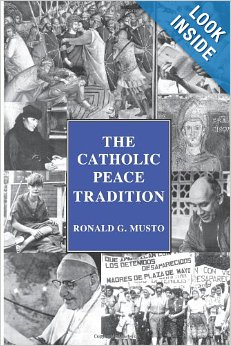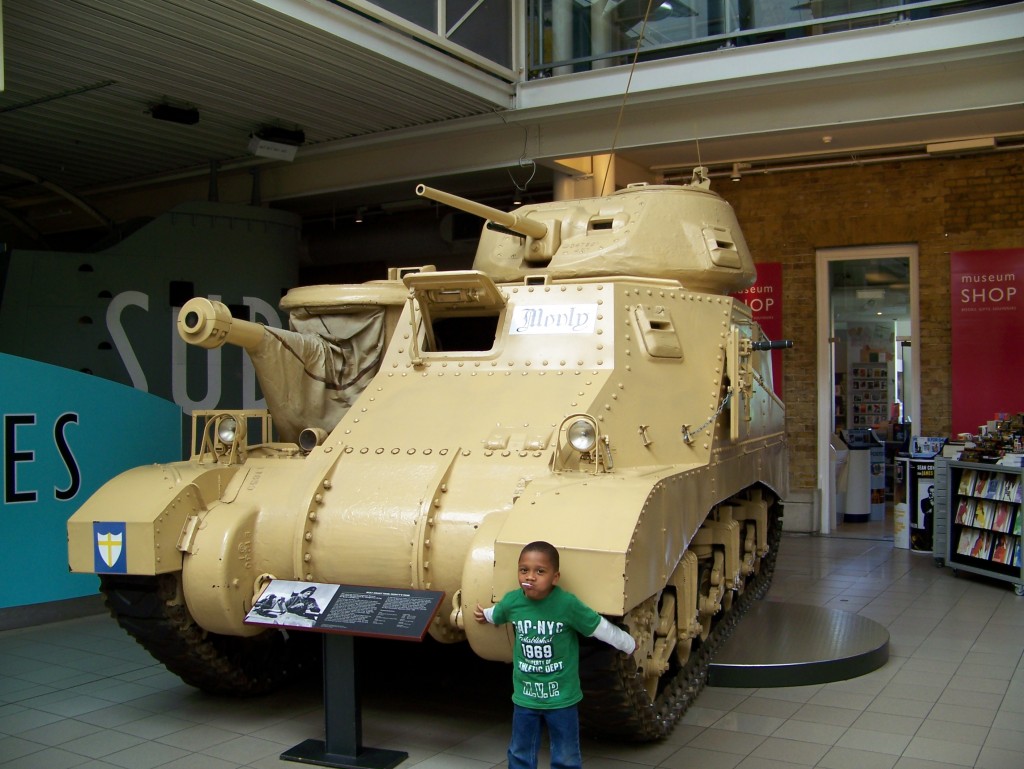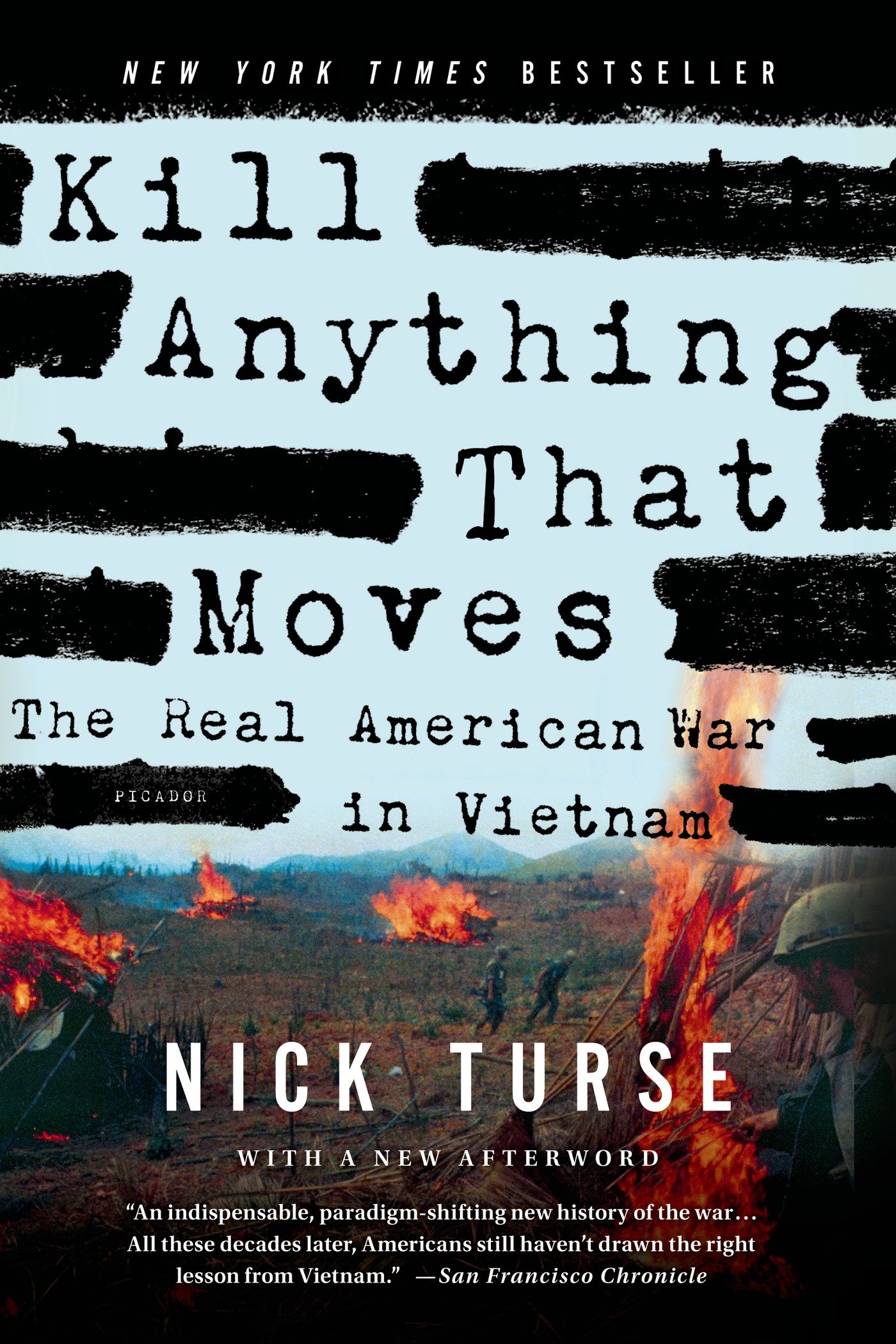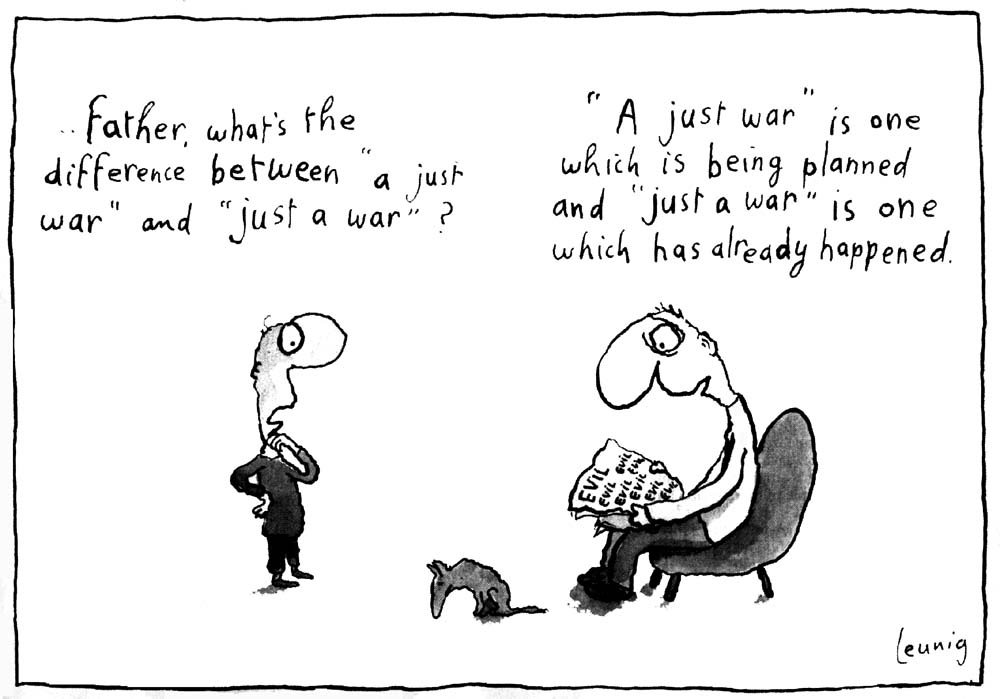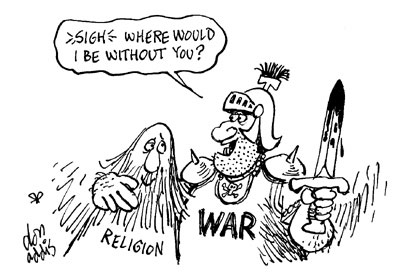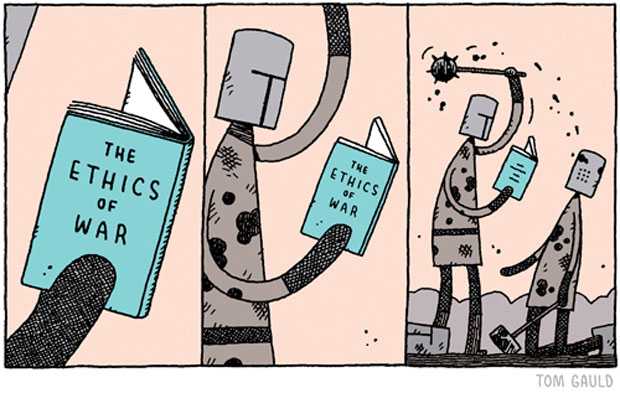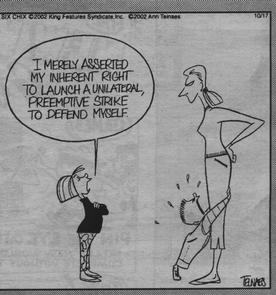“The effort one is obliged to make in order to acquire moral certainty that an action is morally permissible is to be measured by the importance of the action itself and the consequences which can be reasonably anticipated. If the life of a neighbor is liable to be imperiled by actions of ours, we must choose the safest course of action so as to avoid this evil effect. War with its dire consequences can never be waged on the grounds of probable right.” —Rev. Bernard Haring, C.SS.R., THE LAW OF CHRIST, Vol I, Nihil Obstat and Imprimatur (1960)
Category Archives: Just War
Lenten Reflection 2: Self Deception
This ten-minute video talk is the second part in a series of Lenten reflections by Rev. Emmanuel Charles McCarthy.
“It is all but impossible to get a person to see a truth if his or her livelihood or status, or even just comfort, depends on him or her not seeing that truth.” — Rev. Emmanuel Charles McCarthy
“Oh, what a tangled web we weave / When first we practise to deceive!” Marmion, Walter Scott
The Catholic Peace Tradition
If only every student at a Catholic high school or college was required to read this book! I am reading it now and highly recommend it.
This book is a history of the peace tradition in the Roman Catholic Church from the time of the Gospels to the twentieth century. Its purpose is to show that there is a continuing, unbroken, and self-sustaining stream within Catholicism from the martyrs and pacifists of the early church to John XXIII and the peacemakers of our time.
Read the reviews on Amazon.
“To reach peace, teach peace.” — Pope John Paul II
History Lesson on 100 years of War
As the 100 year anniversary of the First World War approaches, the Guardian has a fascinating slideshow on “Britain’s 100 years of conflict.” It takes a while to get through it, but it’s well worth viewing. Everyone will draw their own lessons from it, but here are some items that struck me:
–British forces had over 900,000 dead or missing in WWI as compared to 383,000 in WWII.
–Churchill famously said (in 1919) that he was “strongly in favour of using poisoned gas against uncivilised tribes.”
–The Brits sent troops to help the French against Vietnamese communists and nationalists in Indochina after WWII. “As fighting with Viet-Minh forces quickly escalated, Japanese prisoners were rearmed, placed under British command and compelled to join the conflict.”
–In the war to reclaim the Dutch East Indies (indonesia), “there were mutinies among British troops who were sickened by the ferocity of their Dutch allies. In February 1946, British and Indian troops threatened to turn on the Dutch if the slaughter of civilians continued.”
–We learn that 4 million people died in the Korean war but the entry on the 2003 Iraq war does not list total casualties. Maybe that’s because the Iraq war is not really over yet?
Question for British and American Catholics:
How does one apply the “just war” teaching if you are a citizen of an empire which is engaged in nearly a constant state of warfare throughout the globe?
Kill Anything That Moves
From Amazon:
Based on classified documents and first-person interviews, a startling history of the American war on Vietnamese civilians.
The American Empire Project
Winner of the Ridenhour Prize for Reportorial Distinction
Americans have long been taught that events such as the notorious My Lai massacre were isolated incidents in the Vietnam War, carried out by just a few “bad apples.” But as award-winning journalist and historian Nick Turse demonstrates in this groundbreaking investigation, violence against Vietnamese noncombatants was not at all exceptional during the conflict. Rather, it was pervasive and systematic, the predictable consequence of official orders to “kill anything that moves.”
Drawing on more than a decade of research into secret Pentagon archives and extensive interviews with American veterans and Vietnamese survivors, Turse reveals for the first time the workings of a military machine that resulted in millions of innocent civilians killed and wounded—what one soldier called “a My Lai a month.” Devastating and definitive, Kill Anything That Moves finally brings us face-to-face with the truth of a war that haunts America to this day.
Today in the Gospel
Mark 7: 1 – 13:
When the Pharisees with some scribes who had come from Jerusalem
gathered around Jesus,
they observed that some of his disciples ate their meals
with unclean, that is, unwashed, hands.
(For the Pharisees and, in fact, all Jews,
do not eat without carefully washing their hands,
keeping the tradition of the elders.
And on coming from the marketplace
they do not eat without purifying themselves.
And there are many other things that they have traditionally observed,
the purification of cups and jugs and kettles and beds.)
So the Pharisees and scribes questioned him,
“Why do your disciples not follow the tradition of the elders
but instead eat a meal with unclean hands?”
He responded,
“Well did Isaiah prophesy about you hypocrites,
as it is written:
This people honors me with their lips,
but their hearts are far from me;
In vain do they worship me,
teaching as doctrines human precepts.
You disregard God’s commandment but cling to human tradition.”
He went on to say,
“How well you have set aside the commandment of God
in order to uphold your tradition!…”
Chomsky at West Point
Interesting speech given by Noam Chomsky on “Just War” at West Point in 2006. What is interesting about it is that he traces thought on Just War back to two people, “Hugo Grotius, famed 17th century humanist, who founded the dominant framework of thinking on laws of war” and Rousseau in the 18th century. There is no mention of Saint Augustine or Christianity, though he goes on to outline basic tenets of Christian Just War theory.
Meanwhile, he says, “In brief, my own conclusions are that the literature merits careful attention, but is ultimately not very instructive about just war; secondly, that the notions of human nature should be at the heart of the discussion, although serious inquiry into this is still in its early stages; and third…” Well, I would think that notions of human nature might be something the Church has a little bit of insight on, and might be able to speak to in an inquiry on just war. Yet, Christianity has no place in his discussion. Maybe there is a reason for this.
In his conclusion he states: “…what can one learn from just war theory? My feeling is that from the literature on just war, we learn mostly about the prevailing moral and intellectual climate in which we live.” And he’s right. Christians and Christianity have nothing to offer, it seems, nothing to say, nothing to add to help shape and influence the moral and intellectual climate in which we live when it comes to war. The Vatican seems to have plenty to say about war, but who listens to them? Certainly not Catholics, so why should anyone else? Christianity has become irrelevant on this issue, and it’s not hard to understand why.
Here is the text of Chomsky’s speech.
Define “militarism”
This video on Catholic “Just Defense” theory has one explanation and definition of militarism. It also gives a decent overview of Catholic Just War theory: where it came from and what it says. It has six parts but is only about 30 minutes long in total:
“Those who hold this position or set of assumptions believe that violence and war are not evil in themselves and can be effective means to bring about positive result. Violence and war can be used to right wrongs, to protect the innocent, and to restore order and peace. Indeed the militarist position maintains that not only is killing for the right reasons justifiable, it is also honorable and noble. Human beings are violent by nature, the militarist position reasons, and so good people must not avoid violence. It is imperative that the good guys outgun the bad guys. Thus, legitimate violence, the violence of the good guys, is a sign of courage and virtue, and the rejection of such violence is a sign of cowardice, or vice. Violence is glorified, and the good guys who employ legitimate, sanctioned violence are heroes.”
Plenary Assembly, International Theological Commission
*** This was written by Rev. Emmanuel Charles McCarthy. We have inserted the images.***
Are the bishops, priests and deacons in the Catholic Church in the United States listening to this fellow? How about Ireland, England, Canada, Australia, Europe, Africa, South America, Asia? If the Pope had said that Catholics must return to the reception of Holy Communion on the tongue only, the U.S., British, Irish, etc. airwaves, TV, radio talk shows, Internet, papers, magazines and pulpits—from the far right to the middle of the road to the far left—would be ceaselessly and volcanically bellowing in all directions. However, the Pope says, “The definitive revelation of God in Jesus Christ makes every recourse to violence in God’s name ultimately 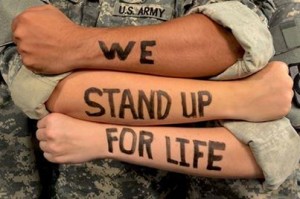 impossible,” and the silence is so total that you can hear a U.S. drone strike seven thousand miles away in Pakistan—if you care to listen. Communion on the tongue or in the hand is an utter irrelevancy. Christ’s refusal of violence, His overcoming evil with good, thereby making recourse to violence for the Christian impossible is as strong an indictment as can be made on the failure to catechize and spiritually guide the Catholic flock along the Way of Jesus in many countries of the world. Yet all of the Catholic right, middle and a significant percentage of the Catholic left “ho hum” it. The use of calculated silent indifference as a method of refusing to acknowledge that something of ultimate importance is being said is the bread and butter of corporate mass media, I would think that the use of such a methodology by Church leaders would cause them to sleep poorly at night.
impossible,” and the silence is so total that you can hear a U.S. drone strike seven thousand miles away in Pakistan—if you care to listen. Communion on the tongue or in the hand is an utter irrelevancy. Christ’s refusal of violence, His overcoming evil with good, thereby making recourse to violence for the Christian impossible is as strong an indictment as can be made on the failure to catechize and spiritually guide the Catholic flock along the Way of Jesus in many countries of the world. Yet all of the Catholic right, middle and a significant percentage of the Catholic left “ho hum” it. The use of calculated silent indifference as a method of refusing to acknowledge that something of ultimate importance is being said is the bread and butter of corporate mass media, I would think that the use of such a methodology by Church leaders would cause them to sleep poorly at night.
Here is Pope Francis on Vatican radio.
(Vatican Radio, 1/15/14) Pope Francis received the participants in the Plenary Assembly of the International Theological Commission on Friday. The three main themes the Commission is addressing throughout the course of its current five-year study period are: the relations between monotheism and violence; the social doctrine of the Church; and, the “sense of the faith.” Speaking of the possible perversions of authentic faith in the one true God, Pope 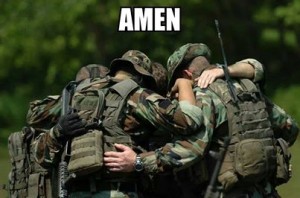 Francis said, “The definitive revelation of God in Jesus Christ makes every recourse to violence in God’s name ultimately impossible. It is precisely because of [Christ’s] refusal of violence, because of his having overcome evil with good, with the blood of his Cross, that Jesus has reconciled men to God and each other.”
Francis said, “The definitive revelation of God in Jesus Christ makes every recourse to violence in God’s name ultimately impossible. It is precisely because of [Christ’s] refusal of violence, because of his having overcome evil with good, with the blood of his Cross, that Jesus has reconciled men to God and each other.”
P.S. If you would like a good warm-up piece to read before the International Theological Commission publishes its full text (only a very brief summary has been published at this hour), you might want to read, hopefully read again (!), Violent Monotheism: True or False? that can be found on either of the two websites below, as Chapter 3 In the book All Things Flee thee For thou Fleest Me, or as Chapter 5 in Christian Just War Theory: The Logic of Deceit. Also as I understand the content of the International Theological Commission’s document, Chapter 5, The Nonviolent Trinity, in All Things Flee thee For thou Fleest Me could be most helpful.
“That conversation may be coming”
Arrest of Catholic Anti-war Protestor Highlights Progressive Church Opposition to Drone Strikes, Huffington Post, January 27, 2014
“Anti-war activist Brian Terrell began serving a six-month sentence Friday at the federal prison camp in Yankton, South Dakota. Last April, Terrell and about 40 others staged a protest at Whiteman Air Force Base in Missouri to demand an end to U.S. drone bombings in Pakistan, Yemen and other countries….”

